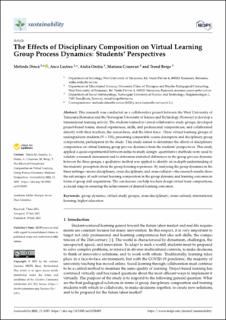| dc.contributor.author | Dincă, Melinda | |
| dc.contributor.author | Luștrea, Anca | |
| dc.contributor.author | Onițiu, Atalia | |
| dc.contributor.author | Crașovan, Mariana | |
| dc.contributor.author | Berge, Trond | |
| dc.date.accessioned | 2023-02-22T12:05:05Z | |
| dc.date.available | 2023-02-22T12:05:05Z | |
| dc.date.created | 2022-01-11T14:17:25Z | |
| dc.date.issued | 2021 | |
| dc.identifier.citation | Sustainability. 2021, 13 (15), . | en_US |
| dc.identifier.issn | 2071-1050 | |
| dc.identifier.uri | https://hdl.handle.net/11250/3053242 | |
| dc.description.abstract | This research was conducted as a collaborative project between the West University of Timișoara (Romania) and the Norwegian University of Science and Technology (Norway) to develop a transnational learning activity. The students learned in virtual collaborative study groups; developed project-based teams; shared experiences, skills, and professional competencies; and collaborated directly with their teachers, the researchers, and the labor force. Three virtual learning groups of undergraduate students (N = 131), presenting comparable course descriptors and disciplinary group compositions, participated in the study. This study aimed to determine the effects of disciplinary composition on virtual learning group process dynamics from the students’ perspectives. This study applied a quasi-experimental between-subjects study design: quantitative methods were used to validate a research instrument and to determine statistical differences in the group process dynamic between the three groups; a qualitative method was applied to identify an in-depth understanding of the students’ perception about the group learning experience. By analyzing the group dynamics in the three settings—mono-disciplinary, cross-disciplinary, and cross-cultural—the research results show the advantages of each virtual learning composition in the group dynamic and learning outcomes in terms of group skill acquisitions. The conclusions can help teachers design virtual team compositions, a crucial stage in ensuring the achievement of desired learning outcomes. | en_US |
| dc.language.iso | eng | en_US |
| dc.publisher | MDPI | en_US |
| dc.rights | Navngivelse 4.0 Internasjonal | * |
| dc.rights.uri | http://creativecommons.org/licenses/by/4.0/deed.no | * |
| dc.title | The effects of disciplinary composition on virtual learning group process dynamics: Students’ perspectives | en_US |
| dc.title.alternative | The effects of disciplinary composition on virtual learning group process dynamics: Students’ perspectives | en_US |
| dc.type | Peer reviewed | en_US |
| dc.type | Journal article | en_US |
| dc.description.version | publishedVersion | en_US |
| dc.source.pagenumber | 0 | en_US |
| dc.source.volume | 13 | en_US |
| dc.source.journal | Sustainability | en_US |
| dc.source.issue | 15 | en_US |
| dc.identifier.doi | 10.3390/su13158493 | |
| dc.identifier.cristin | 1978460 | |
| cristin.ispublished | true | |
| cristin.fulltext | original | |
| cristin.qualitycode | 1 | |

